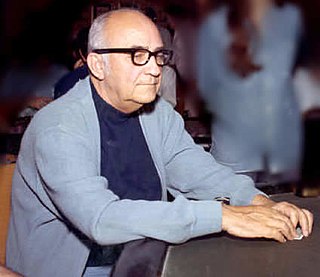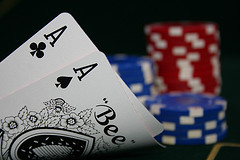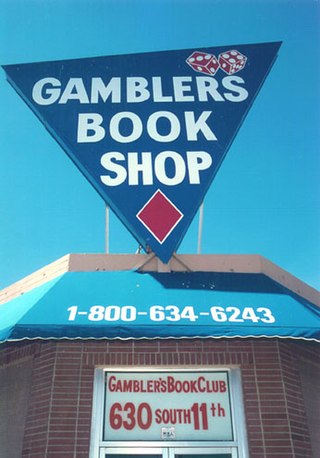In poker, pot odds are the ratio of the current size of the pot to the cost of a contemplated call. Pot odds are compared to the odds of winning a hand with a future card in order to estimate the call's expected value. The purpose of this is to statistically guide a player's decision between the options of call or fold. Raising is an alternative to place this decision on the opponent.

In the card game of poker, a bluff is a bet or raise made with a hand which is not thought to be the best hand. To bluff is to make such a bet. The objective of a bluff is to induce a fold by at least one opponent who holds a better hand. The size and frequency of a bluff determines its profitability to the bluffer. By extension, the phrase "calling somebody's bluff" is often used outside the context of poker to describe situations where one person demands that another proves a claim, or proves that they are not being deceptive.

Texas hold 'em is one of the most popular variants of the card game of poker. Two cards, known as hole cards, are dealt face down to each player, and then five community cards are dealt face up in three stages. The stages consist of a series of three cards, later an additional single card, and a final card. Each player seeks the best five-card poker hand from any combination of the seven cards: the five community cards and their two hole cards. Players have betting options to check, call, raise, or fold. Rounds of betting take place before the flop is dealt and after each subsequent deal. The player who has the best hand and has not folded by the end of all betting rounds wins all of the money bet for the hand, known as the pot. In certain situations, a "split pot" or "tie" can occur when two players have hands of equivalent value. This is also called "chop the pot". Texas hold 'em is also the H game featured in HORSE and HOSE.

David Sklansky is an American professional poker player and author. An early writer on poker strategy, he is known for his mathematical approach to the game. His key work The Theory of Poker presents fundamental principles on which much later analysis is based.

Johnny Moss was a gambler and professional poker player. He was the first winner of the World Series of Poker (WSOP) Main Event, at the time a cash game event in which he was awarded the title by the vote of his peers in 1970. He also twice won the current tournament format of the WSOP Main Event in 1971 and 1974. He was one of the charter inductees into the Poker Hall of Fame in 1979.

In Texas hold 'em, a starting hand consists of two hole cards, which belong solely to the player and remain hidden from the other players. Five community cards are also dealt into play. Betting begins before any of the community cards are exposed, and continues throughout the hand. The player's "playing hand", which will be compared against that of each competing player, is the best 5-card poker hand available from his two hole cards and the five community cards. Unless otherwise specified, here the term hand applies to the player's two hole cards, or starting hand.
Mason Malmuth is an American poker player, and author of books on both poker and gambling. He is the owner of Two Plus Two Publishing, which publishes books and runs an online gambling discussion forum.

Ivo Donev is a Bulgarian, with Austrian passport, who is a professional chess and poker player.

Edward Raymond Miller is an American professional poker player and an author of books about poker. He wrote Small Stakes Hold 'em: Winning Big With Expert Play with David Sklansky and Mason Malmuth in 2004. In 2005, he completed Getting Started in Hold 'em, a beginner's book.

Russell Aaron Boyd, commonly known as Dutch Boyd, is an American professional poker player from Culver City, California.

Jamie M. Gold is an American television producer, talent agent, and poker player, based in Malibu, California. He is known for winning the 2006 World Series of Poker (WSOP) Main Event and currently divides his time between his activities as president of production for the entertainment company, Buzznation and poker competition, primarily major tournaments. His 2006 WSOP victory is the sixth largest single payout in poker tournament history.
Stewart Reuben is a British chess player, organiser, arbiter and author. He has also been a professional poker player, been called "one of Britain's foremost poker players" and "one of the best two or three players in England", and written several books on the topic.
Sunny Mehta is an American hockey executive, data scientist, and former professional poker player, writer, options trader, and musician. Currently the Assistant General Manager and Head of Analytics for the Florida Panthers, he pioneered the first full-time analytics department in the National Hockey League as Director of Hockey Analytics for the New Jersey Devils. He is co-author of two bestselling poker strategy books.

Gambler's Book Club / GBC Press is a bookstore & small press dedicated to gambling. Now located at 5473 S Eastern Ave in Paradise, Nevada, it was originally located in the Huntridge area of Las Vegas. The company has operated for over 40 years. Along with original books on various forms of gambling, the company engaged in the reprinting of "classic" works related to gambling that had long passed out of copyright, furthering Founder John & Edna Luckman's vision of Gambler's Book Club as a place of learning for gamblers.

Tommy Angelo is an Oakland, California professional poker player, writer, and coach. Angelo was a career musician in the 1980s, performing rock and country on drums and piano. In 1990, he became a full-time professional poker player. Since then has since written 150 magazine articles, written and produced 60 poker-training videos, and written and published four books on poker, and one book on meditation.
Poker is a popular card game that combines elements of chance and strategy. There are various styles of poker, all of which share an objective of presenting the least probable or highest-scoring hand. A poker hand is usually a configuration of five cards depending on the variant, either held entirely by a player or drawn partly from a number of shared, community cards. Players bet on their hands in a number of rounds as cards are drawn, employing various mathematical and intuitive strategies in an attempt to better opponents.
In poker, the Independent Chip Model (ICM), also known as the Malmuth–Harville method, is a mathematical model that approximates a player's overall equity in an incomplete tournament. David Harville first developed the model in a 1973 paper on horse racing; in 1987, Mason Malmuth independently rediscovered it for poker. In the ICM, all players have comparable skill, so that current stack sizes entirely determine the probability distribution for a player's final ranking. The model then approximates this probability distribution and computes expected prize money.
The card game of poker was developed in the United States at some point during the early 19th century, drawing its name and basic concept from much earlier European games. Since its early beginnings, poker has grown to become an extremely popular pastime throughout the world.
The Theory of Poker is a 1978 book written by David Sklansky. Sklansky has authored or co-authored 13 books on poker. The Theory of Poker is still relevant even after 30 years of its release. This is considered as very crucial book for the poker player.